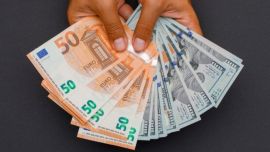President Mauricio Macri’s 59th birthday on Thursday arrives early into a stellar international year which will culminate in Argentina chairing the G20. But on the day itself that number of 20 took on an entirely different meaning – the dollar broke the psychological 20-peso barrier for the first time. It might seem hard to see this as a birthday present for Macri, given the inflationary pressures added to an index already struggling to cope with transport and utility bill updating and higher fuel prices, but in certain ways it is. If economic health demands more realistic pricing for transport and utility billing (to reduce the subsidy mountain), why not for the dollar too? In many ways a more competitive exchange rate was the chief objective of the “recalibration” of this year’s inflation targets at the end of 2017 – both the trade figures and the balance of payments stand to gain (not to mention the Central Bank’s quasi-fiscal deficit being magically slashed since its assets are almost entirely in dollars in the form of reserves while its liabilities such as Lebacs etc. are measured in pesos). Other factors have contributed to the surge – the grain freight conflict limiting export dollars, the usual summer vacation demand for trips abroad and the ongoing five-day bank hiatus between strikes and Carnival – but much of it seems a deliberate consequence of “recalibration.”
The dollar has become so central a part of national life that many people tend to assume that its movements are entirely the product of Argentine conditions and forget that it is actually the currency of another country (namely, the United States). Nor is it as if nothing were happening in that homeland to influence the exchange rate – thus Wall Street has lost over four percent of its value twice in one week following a two-year bonanza. These plunges anticipate rising interest rates and the 70-billion-peso bond placed here on the market on Wednesday could be seen as a bid to stay ahead of the game. Yet time is rapidly running out for a policy of financing deficit with debt which in any case could only have lasted a couple of years more at most. These global trends might well prove a turning-point for the economic policies of the Macri administration – food for thought at next week’s spiritual retreat in Chapadmalal.
If the higher interest rates now hitting Wall Street end up causing a massive capital flight from emerging markets, Argentina has a Plan B – some estimates of Argentine money stashed abroad have approximated 80 percent of the economy and all the government has to do (so little and so much at the same time) is create confidence in order to start tapping that wealth. Last year’s successful tax whitewash shows the way, as does Wednesday’s peso bond far more recently. But creating confidence will require something more than winning elections – Macri’s Cambiemos coalition will need to live up to its “Let’s Change” label with some major reforms and no currency is credible at current levels of inflation. Now that the outside world seems to be closing down the easy way out of debt, Macri needs to start exploring the alternatives – perhaps gradualism as such needs to be “recalibrated,” not just this year’s inflation targets. For President Macri, life could begin at 59.

















Comments